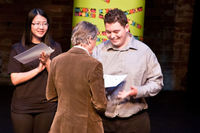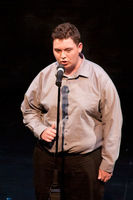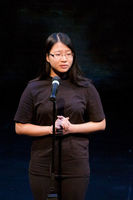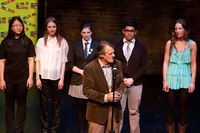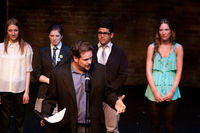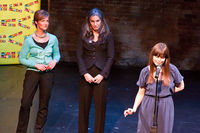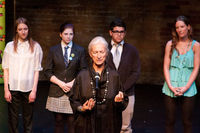A Poetry Love-In: The Poetry In Voice Recitation Finals
Someone, I think it was Robert Bly, said you feel a good poem all along your body, which probably explains the goose bumps I got when I attended the Poetry In Voice/Les voix de la poésie recitation finals on April 12. There was a lot of good poetry.
Poetry In Voice is the latest brainchild of Scott Griffin, who’s already proved his dedication to poetry and its development and appreciation with the Griffin Prize. This time he’s focused not on poets but on high school students. The idea was simple, as he explained to the packed house at the Young Centre for the Performing Arts, “Memorization is as close as you can get to a poem without having written it.” Memorization and then the recitation of it demands close attention to the poem, an understanding of meaning, intent and beauty.
The 12 finalists, from all over Ontario, certainly showed that understanding. The rules were simple, Albert Schultz, the host for the competition explained: the contestants would each recite one poem in the first round, a second in the next and then the top three would face off with one last poem. They were judged on multitude of complex criteria including their accuracy, their evidence of understanding, the poem’s level of difficulty and their overall performance. And the stakes were high — $10,000 in prizes; $5,000 going to the first prize winner along with a significant amount to their school for library books, a portion of which was ear-marked for poetry.
All that would be difficult enough, but they were doing it in front of a seriously intimidating sold-out crowd that included not only friends and teachers but poets, writers, publishers and the likes of Dennis Lee, Robert Lalonde, Margaret Atwood and of course, Scott and Krystyne Griffin.
Except the whole thing was clearly a poetry love-in, and the audience couldn’t have been more supportive of the teenagers on stage. The crowd was quick to applaud loudly, hoot and holler and got to their feet more than once in a standing ovation. There were sighs and laughter when people recognized lines from familiar poems that maybe they had once upon a time also known.
The poems were classics, drawn from an online anthology in both English and French. Each student was required to have three poems ready to go, but a couple of them hadn’t stopped there.
“I’ve been working on these poems for a couple of weeks,” said Victoria Campbell, a Grade 11 Student at Toronto French School who recited Emile Verhaeren’s ‘Le Moulin’ and Sandburg’s ‘I am the People, the Mob.’ “I used different poems at the previous level.”
Anna Jiang, a grade 12 student from Victoria Park Collegiate Institute, who came second in the competition with ‘A Satirical Elegy On the Death of a Late, Famous General,’ by Jonathon Swift had also changed up her poems since winning her school competition. “I needed a higher level of difficulty,” she explained. “I wanted to look at longer poems to be explore the content more thoroughly.”
Jiang was one of the few students who admitted to writing poetry of her own and has submitted her work to Toronto Public Library youth competitions. Most of the others, like David Castillo, a grade 12 student at London Central Secondary School were initially interested in the public speaking aspect of it. “I’m not really known as the poetry kind,” Castillo said, which one wouldn’t have known from his recitations of ‘Charge of the Light Brigade’ and a very funny rendition of Robert Browning’s ‘My Last Duchess.’ “But I’ve gotten into it. I like that the feeling and meaning is harder than prose.”
Nerves took their toll on the three finalists — Jiang, Spencer Slaney, a grade 10 student from Lockerby Composite School who recited Poe’s ‘Annabelle Leigh,’ and Jonathon Welstead, a grade 12 student at Upper Canada College who recited ‘Preludes’ by T.S. Eliot. A couple of the evening’s only fumbles were made in the last few minutes of the competition.
Your CanLit News
Subscribe to Open Book’s newsletter to get local book events, literary content, writing tips, and more in your inbox
In the end it was Welstead, who had pulled out a Scots brogue for his first poem, ‘To a Mouse’ by Robert Burns, that took the top prize with $1,000 going to Jiang and $500 to Slaney, who almost had the audience reciting along with him through his enthusiastic telling of Lewis Carroll’s ‘Jabberwocky.’
On the way out I ran into one of my former writing professors. She asked me how my poetry repertoire was. I had to admit it wasn’t good, I probably haven’t learned something new since I memorized Shakespeare in high school. But I’d been thinking while watching the students recite and the audience respond that maybe I should. It was the goose bumps that brought me to poetry in the first place. And I think Scott Griffin is probably right. Next to writing a poem, memorizing it is the next best way to make it partially yours. “Then it’s always with you,” he said. “You can always count on it.”
Next year the competition will be open to high schools in Ontario and Quebec, and two years from now it will go nationwide. Maybe by then we’ll have some Canadian poems on the list, and some new classics to listen to.
We hope people are happy to see pictures of themselves on Open Book’s image gallery, but if you’d like your photo removed please contact us at info@openbooktoronto.com and we’ll remove it as soon as possible.
Tanis Rideout writes both poetry and fiction. In 2010 Rideout won second prize in the CBC Literary Awards for her poems about Marilyn Bell. Her first novel, Above All Things, was released in Canada in 2012, and in the US and UK in 2013.
